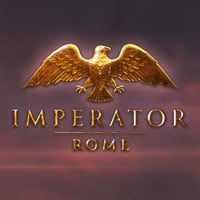Diplomacy in Imperator Rome
Last update:
Diplomacy is one of the main tools in Imperator: Rome. Many of its actions give you a chance to establish various relationships and agreements with other nations.
There is no diplomatic corps in the game and there is no need to send specific characters who will represent your interests. In the diplomacy tab, you can select the country you are interested in to learn its opinion about your nation and choose one of the available diplomatic actions. Many of these actions will cost you a specific amount of Oratory points. Here you can declare war, ask for peace or make an alliance. This mode also allows you to select other countries to see their relations and dependencies. Diplomatic reputation plays a significant role. It can encourage other states to enter into treaties and agree on the proposed terms. It also affects the integration of subordinate states.
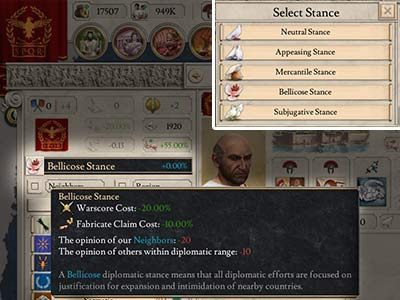
The diplomatic stance is your general attitude to all states. Each stance offers bonuses and has some restrictions. For example, the mercantile stance reduces the cost of creating trade routes, increases revenue from trade and strengthens your reputation among other states. On the other hand, bellicose stance reduces your reputation among the neighboring states but reduces the cost of acquiring rights to the province (fabricate claim) and reduces the cost of the conquered territories which is charged as a result of the war (war score cost). Changing stance requires Oratory points - sometimes, changing your stance is useful when you want to conquer surrounding nations or increase trade.
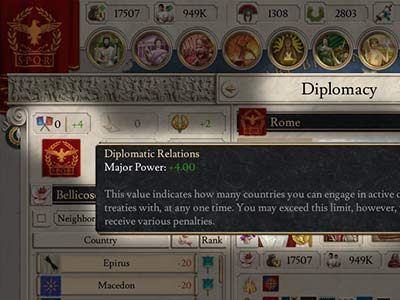
Diplomatic relations are a limit that describes how many permanent diplomatic agreements you can have with other nations. This limit includes alliances, vassals and defensive leagues. The higher the country rank, the more relations you can have. A city-state can have 1 relation and Regional Power can have up to 3 relations. You can have more relations than your current limit, but it will increase all expenses that require power points. Some events, laws, trade resources can increase the number of diplomatic relations. This is a very useful factor for each state - more allies or vassals will increase your strength in the political arena.
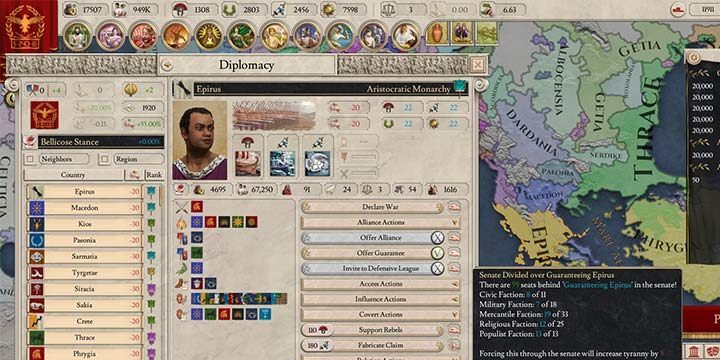
The game has many diplomatic options. Over time, you will be able to increase this range. Select the diplomacy tab and click on a state. Once you choose any diplomatic action, you need to wait one in-game month to be able to send another diplomat.
Available diplomatic actions:
- Declare War/Sue for Peace. After selecting this option, you can view the list of available reasons for war - casus belli. In addition, you can see who will be on the side of the selected state, and what nations are entering the war with you. After declaring the war, this option is changed to "Peace deal". In the new window, you can see which cities and provinces you can take. You can also release conquered nations or enslave conquered nations.
- Offer/Dissolve Alliance. You can try to make an agreement between the chosen state and participate in joint wars when you are asked to do so. In this way, you can protect yourself from the aggression of larger or stronger states. You can have alliances with states with the same rank. Great Powers can't enter alliances.
- Guarantee offer. You can offer protection to a nation. Thus, each nation that declares war on a nation that received your guarantee will automatically have to fight with the nation which gave the guarantee. This way you can improve your reputation with a chosen nation and protect your borders. A state that has accepted the guarantee offer must first give up this status to declare war on your nation.
- Invite/Kick/Leave defensive league. Low-rank states, called city-states, and local powers can create a defensive league. This alliance may contain many members but is not used for aggression against another state. It activates only when one of the members is attacked. Thanks to this decision, small nations have a chance to confront more powerful opponents. A defensive league takes 1 point of diplomatic relations, regardless of the number of members.
- Ask/Give military access. This agreement allows your army to pass through the territory of the selected country, as well as the use of their ports. This action is useful if you don't have the option to reach a country with which you are at war, or when you want to attack from multiple sides.
- Demand Tribal Vassal Status. This action can only be used on tribal forms of government. The chosen nation should have +100 opinion about your nation and have less negative reasons to accept such status. This status doesn't take place in diplomatic relations and it doesn't participate in the overlord wars. Each tribe raises the happiness of tribesmen throughout your state and provides a certain amount of human resources on a monthly basis. Such a tribe can't be integrated diplomatically and could relinquish that status at any time.
- Demand-tribute. Any nation can be called to pay tribute and will not take place in the limit of diplomatic relations. The chosen state will pay part of its income each month. Such a nation can at any time relinquish that status and can't be politically integrated.
- Offer a feudatory status/Client state. You can offer this status to small nations with the same culture. This way you will get a nation under your control that will take part in your wars, will pay you part of its income and deliver part of their human resources each month. A nation with feudatory status can be integrated into your state. A client state has the same bonuses and is integrated in the same way but is offered to larger powers rather than small states.
- Intervene in war/Threaten war/Enforce peace. You must have at least a Major Power to be able to choose any of these options. The Intervene option allows you to take part in the war, which is already underway provided you have positive relations with the selected nation. You can threaten war only if you have any claims to the target state. If the enemy agrees, you will get their territory under your control. If they refuse, the war will begin. Enforce peace works on a state that is in good relations with you. This results in white peace - both sides revert to the state before the war.
- Support rebels. You need Military points to activate the rebels on the territory of the target state. It works only on residents who have a different culture than the state. The elected state also gets a reason to wage war against you. Be careful - helping the rebels is a double-edged sword. If a riot breaks out in the target state, you will automatically side with the rebels.
- Fabricate claims. Thanks to this action, you can get the right to land occupied by another state within the diplomatic range. Thus, you will get a reason for war, which won't weaken your stability and opinion in the international arena. The base cost is 200 Oratory points. However, the rights to a given province are given to you immediately.
- Improve focus. This is the easiest way to raise another state's opinion on yours. During the next few months, your diplomat will be improving the opinion about your state until it reaches the maximum level. After that, the opinion will gradually decline. You can raise the maximum opinion level by developing new technologies, choosing certain laws, etc.
- Send an insult. If you want to wage war with your rival, but don't want to declare war, you can insult them. Thanks to this action, the enemy will get a reason for war and will be more inclined to start it.
- Send gift. With the help of gold, you can improve relations with other states. Your opinion will grow slightly in the chosen nation, but it is a fast and reliable method.
If you want to improve relations with another state, you can try to make friends with their leader, which will also improve the opinion of your nation.
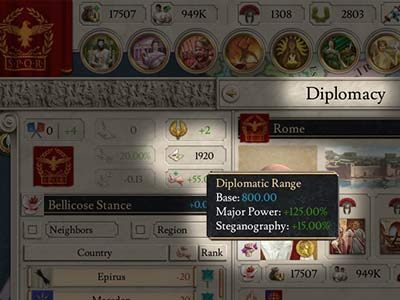
Some of these actions require that the destination state or province be within the Diplomatic range. The higher the state rank, the greater the diplomatic range. You can also simply increase the borders of your state. Diplomacy is a very useful tool in solving problems or preventing various risks. It is also an easy way to increase the power of your state and defend yourself against other powers.
Thoughtful use of diplomacy will allow you to survive and succeed. If you play as a small nation, be sure to create a defensive league against the biggest force nearby. If you play as a powerful nation, watch what happens to your neighbors and use the intervene option to influence the fate of other countries and adjust the outcome of the war to your interests. Many of these actions require Oratory points so make sure you have enough of them and refrain from introducing new laws and assimilating subjects.
You are not permitted to copy any image, text or info from this page. This site is not associated with and/or endorsed by the Paradox Interactive or Paradox Development Studio. All logos and images are copyrighted by their respective owners.
Copyright © 2000 - 2025 Webedia Polska SA for gamepressure.com, unofficial game guides, walkthroughs, secrets, game tips, maps & strategies for top games.
